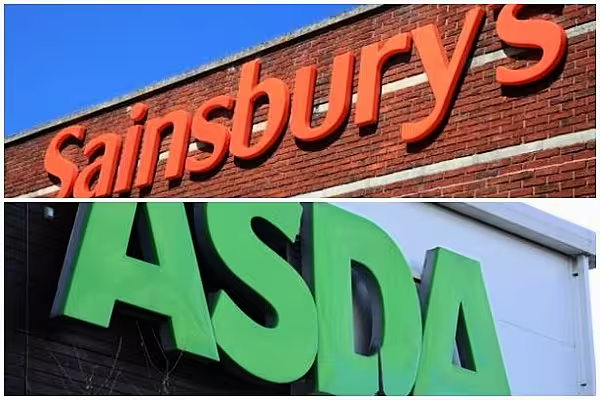British supermarket group Sainsbury's proposed takeover of rival Asda would not be cleared by the competition regulator without the need for "extensive remedies" if precedent is followed, according to market leader Tesco.
The combination of No. 2 player Sainsbury's and No. 3 Asda, which is owned by Walmart, could overtake Tesco.
In its submission to the Competition and Markets Authority (CMA), which is probing the deal, Tesco also questioned the economics of the £7.3 billion transaction, saying it provided few direct customer benefits.
'Extensive Remedies'
Last year the CMA surprised most analysts by clearing Tesco's near £4 billion takeover of wholesaler Booker without the requirement for any remedies, such as store divestments or restrictions on its operations.
But Tesco said this did not mean the regulator should clear Sainsbury's-Asda unconditionally.
"The proposed merger is a 'four-to-three' deal that would not be approved without extensive remedies under existing precedent," Tesco told the CMA.
The CMA said Tesco noted that Sainsbury's and Asda are not proposing to make any big operating cost savings, as they plan to keep their brands and propositions separate.
Sainsbury's and Asda have said the combined group would seek synergies of at least £500 million - £350 million of which would come from harmonising prices from suppliers.
"This is a big ask when the merging parties do not appear to be able to offer suppliers very much in return," Tesco told the CMA.
Win For Customers
Sainsbury's and Asda's key argument is that the deal would lower prices "on everyday items" by around 10% and improve the customer offer of both brands, while allowing suppliers to grow their businesses.
"Customers will be the big winners from the combination," a spokeswoman for Sainsbury's said on Tuesday.
"By bringing our two businesses together, we will be able to invest further in range, quality, and customer service, while lowering prices and reducing the cost of living for millions of UK households.”
Sainsbury's and Asda have both said they believe the CMA will not insist on a level of store disposals that will make the deal, announced in April, unpalatable.
In its submission No. 4 player Morrisons also raised concerns about the creation of "an effective duopoly", controlling in excess of 60% of the market.
"As a result of the merger, prices may increase between those two companies because it would mean the loss of Asda as a major competitive force," Morrisons told the CMA.
Farmers and suppliers have also expressed concern.
The CMA said last month it expected to issue provisional findings early next year, ahead of a final report in March.
News by Reuters, edited by Checkout. Click subscribe to sign up for the Checkout print edition.





